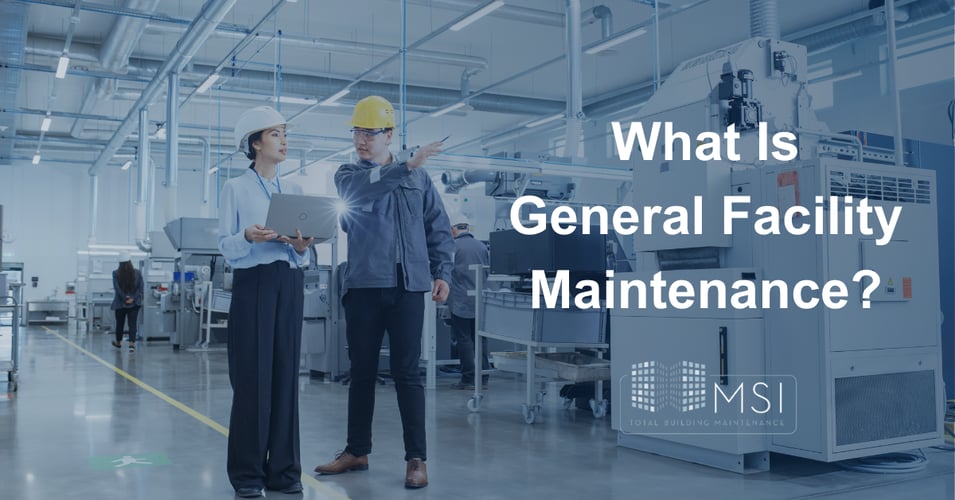What Is General Facility Maintenance?

Table of Contents
When discussing facility management in Minneapolis, the term "general facility maintenance" often comes up. However, not everyone fully understands what it entails. This article clarifies what general facility maintenance includes and its main objectives, such as ensuring safety, enhancing productivity, and extending the lifespan of building systems. We will also explore different maintenance strategies, showcasing their role in delivering effective commercial property solutions in Twin Cities through proactive upkeep and optimized building performance.
General Facility Maintenance Meaning
General facility maintenance involves the regular tasks necessary to keep a building safe, functional, and visually appealing. These include housekeeping, repairs, and inspections. Today, this scope has expanded to include modern practices, such as maximizing energy efficiency and integrating smart technologies. By implementing MSI facility maintenance services, property managers can ensure buildings are updated and compliant with current standards.
What Is the Main Goal of Facility Maintenance?
The primary goal of facility maintenance services is to maintain optimal functionality and safety within a building to ensure a comfortable and productive environment for all occupants. This requires a combination of preventative measures (such as regular inspections and routine upkeep) alongside repairs to address issues as they arise.
Such an approach prevents minor issues from escalating into major problems that may disrupt operations and incur significant costs for the facility. By implementing a maintenance plan, building owners and managers are able to identify and address potential issues before they become major headaches. This proactive approach also enhances the lifespan of building assets. Plus, by conducting regular general facility maintenance, building owners and managers avoid costly repairs and replacements while ensuring the safety and satisfaction of their tenants.
Another goal is to enhance the overall value of the property. Well-maintained facilities are not only more attractive to tenants and clients, they also retain their value over time, which ensures a return on investment. This is particularly important in today’s competitive real estate market, where first impressions often influence leasing decisions.
Lastly, facility maintenance plays a crucial role in compliance with health and safety regulations. By keeping facilities in top shape, property managers protect the welfare of occupants, reduce the risk of accidents, and avoid costly legal penalties that may arise from neglect.
In other words, regular inspections, timely repairs, and proactive maintenance strategies are essential for safeguarding both the property’s value and the health of those who use the space.
What Does General Maintenance Include?
Understanding what general facility maintenance includes requires looking at the wide range of tasks it covers. Typical responsibilities of facility management in Minneapolis include:
- Routine Inspections – Regular checks of structural and system functionalities to identify and resolve issues early.
- Cleaning Services – Ensuring all areas are clean and sanitary, covering tasks like waste disposal and pest control.
- Repairs – Fixing wear-and-tear problems, such as leaky faucets, cracked flooring, or damaged walls.
- System Upgrades – Replacing outdated equipment and upgrading systems to improve energy efficiency and overall performance.
These efforts help maintain smooth operations and create a safe, welcoming environment for tenants and employees. Emergency repair tasks may also be required to address issues impacting daily activities or safety.
What Are the Types of Maintenance in Facilities?
Facility maintenance falls into several categories, each of which has an important role in the overall maintenance strategy. Some common facility maintenance examples include the following:
Preventative Maintenance
Preventive maintenance focuses on regular servicing to prevent equipment breakdowns. This includes routine tasks like lubricating machinery or scheduling HVAC checkups. A proactive total building maintenance by MSI plan ensures energy efficiency, reduced downtime, and extended asset life.
Corrective Maintenance
This reactive type of maintenance is implemented after identifying an issue. Tasks can include repairing HVAC malfunctions or resolving electrical faults. Corrective maintenance brings equipment back to optimal performance and minimizes operational disruptions.
Predictive Maintenance
Using technology and data analysis, predictive maintenance identifies potential failures before they occur. Examples include vibration monitoring tools for machines or using thermal imaging to spot electrical concerns. These strategies help ensure efficient long-term operations.
Emergency Maintenance
This urgent, unplanned maintenance addresses immediate risks, such as responding to burst pipes or system malfunctions. Quick action ensures safety and limits property damage.
Routine Maintenance
Routine maintenance involves scheduled upkeep tasks like cleaning, minor repairs, and consistent inspection of building elements. By maintaining these day-to-day operations, facilities can ensure their long-term functionality.
Conclusion
For property owners in the Twin Cities, adopting comprehensive MSI facility maintenance services can be a game changer. From preventive strategies to modernized upgrades, the right approach not only protects assets but also enhances overall building value. Continuously assessing and refining a maintenance plan ensures that your property operates efficiently and remains competitive in today’s real estate market.
To optimize your facility management efforts, consider partnering with MSI Company. Our expertise in facility management in Minneapolis helps building owners and managers achieve operational excellence. Contact us today to learn how our commercial property solutions in Twin Cities can elevate your building's performance and longevity.






